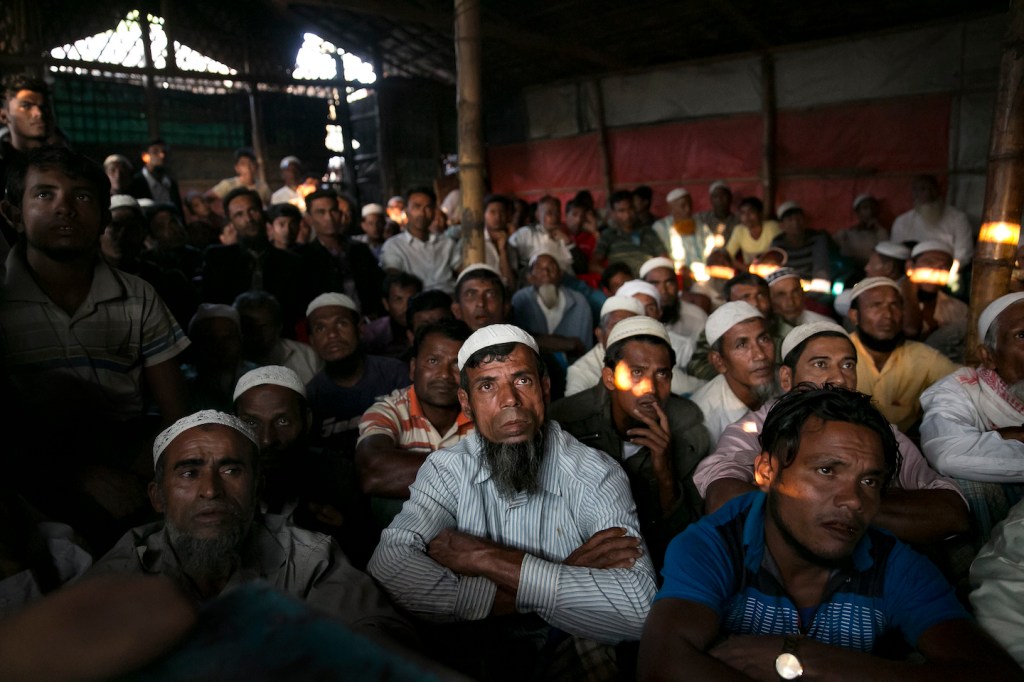Almost 30 years ago, Aung San Suu Kyi was feted as a human rights defender, winning the Nobel Peace Prize. On Tuesday morning she walked into the International Court of Justice in The Hague to answer allegations of genocide conducted by Myanmar’s military.
The Burmese leader led a delegation to the Dutch city to respond to a case filed by The Gambia last month alleging that Myanmar has breached its obligations under the UN Genocide Convention.
Videos by VICE
The African country asserts that the Myanmar military committed atrocities against the Rohingya Muslims in Rakhine State in 2016 and 2017, during a clearing operation that saw thousands of Rohingya killed and more than 700,000 flee to Bangladesh.
Large crowds of Rohingya supporters gathered outside the court on Tuesday morning behind a banner marked “Stop Genocide.” Others carried photos of Suu Kyi with “Shame” and “agent of the military” written under them.
According to court documents, the ICJ’s panel of 17 judges will hear allegations that the clearances were “intended to destroy the Rohingya as a group, in whole or in part,” and that the military committed mass murder, rape, and set fire to Rohingya buildings “often with inhabitants locked inside.”
But Aung San Suu Kyi, who is Myanmar’s State Counselor and de facto head of state, is expected to defend the military action and claim it was a legitimate counter-terrorism response to Rohingya militants.
The Gambia requested this week’s three-day hearing in The Hague to approve temporary measures to “protect the rights of the Rohingya group.”
An Amnesty International report in May concluded that the Burmese military was continuing to commit war crimes against the Rohingya, while a UN report in August accused Myanmar soldiers of “routinely and systematically employing rape, gang rape, and other violent and forced sexual acts against women, girls, boys, men and transgender people.”
Aung San Suu Kyi, who is expected to address the court on Wednesday, was awarded the Nobel Peace Prize in 1991 for championing human rights under the rule of the military junta, before spending 15 years under house arrest. She was released in 2010 and led her National League for Democracy party to election victory in 2015.
She became de facto leader of the southeast Asian nation in April 2016, months before the clearance operations in Rakhine state began in October of that year.
While Suu Kyi is not directly in charge of the military — known as the Tatmadaw — a UN investigator has accused her of “complicity” in the military clearances.
READ: Myanmar’s military is still committing war crimes against the Rohingya
“I implore you to open your eyes and please use your moral authority before it is too late,” Yanghee Lee, the UN’s special rapporteur on Myanmar, said in September.
Lee released another report Tuesday to coincide with the beginning of the hearing in the Hague, calling for a cessation of online threats being made against activists in Myanmar in the wake of The Gambia’s allegations last month.
“I call on each and every organ of the Myanmar State to ensure that absolutely no reprisals are taken against any group or individual that is advocating for justice and accountability in Myanmar,” Lee said in the report.
As well as the ICJ hearing, the International Criminal Court last month approved a full investigation into the role of the Myanmar military in clearing Rohingya Muslims from Rakhine State.
READ: Myanmar says it fired this diplomat from its Rohingya crisis panel. He says he quit.
“There is a mountain of evidence that the Myanmar military has committed crimes under international law and grave human rights violations against the Rohingya population. Yet the government of Myanmar – including Aung San Suu Kyi – has continued to dismiss, downplay or otherwise deny these accusations,” Nicholas Bequelin, Amnesty International’s regional director, said in an emailed statement ahead of Tuesday’s hearing.
“If Aung San Suu Kyi is serious about serving the people of Myanmar, she should be standing side-by-side with victims and survivors in the pursuit of justice, truth and reparation,” Bequelin added. “She should not cover up for those suspected of criminal responsibility.”
Cover: Myanmar’s leader Aung San Suu Kyi sits in the court room of the International Court of Justice in The Hague, Netherlands, Tuesday, Dec. 10, 2019. The U.N.’s highest court on Tuesday begins a hearing into allegations of genocide in Myanmar over the military campaign against the Rohingya minority, with leader Aung San Suu Kyi set to defend those who once held her under house arrest. (AP Photo/Peter Dejong)




